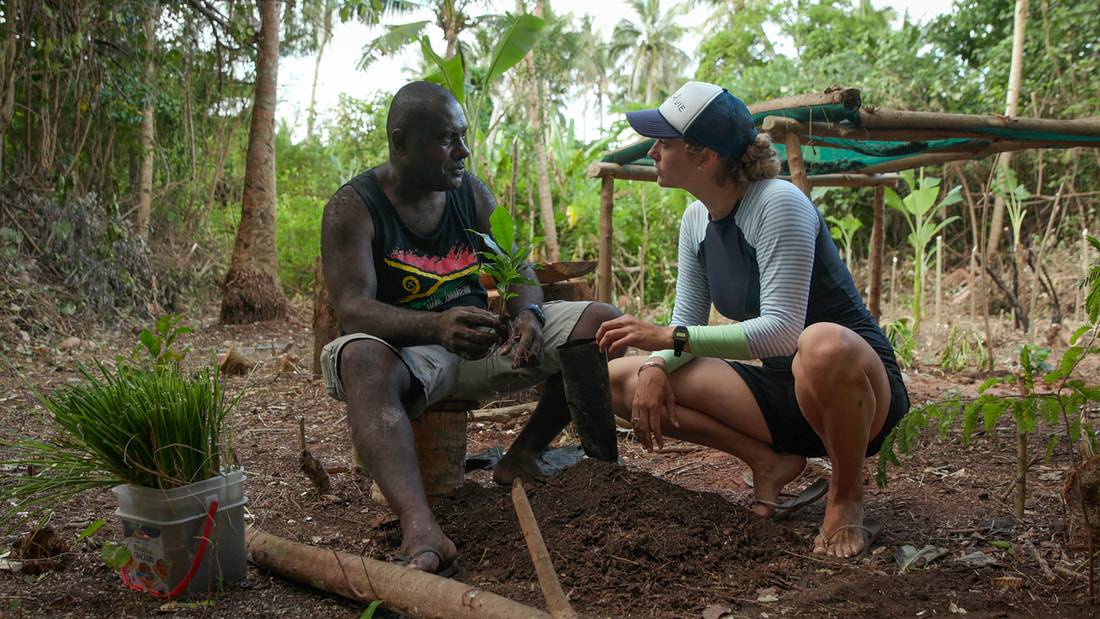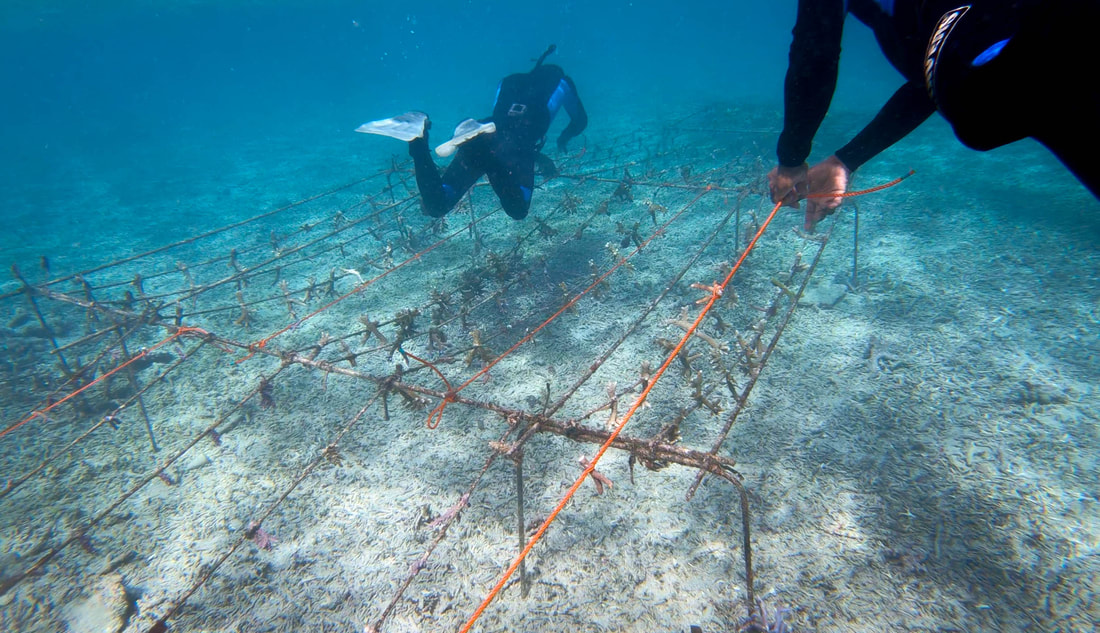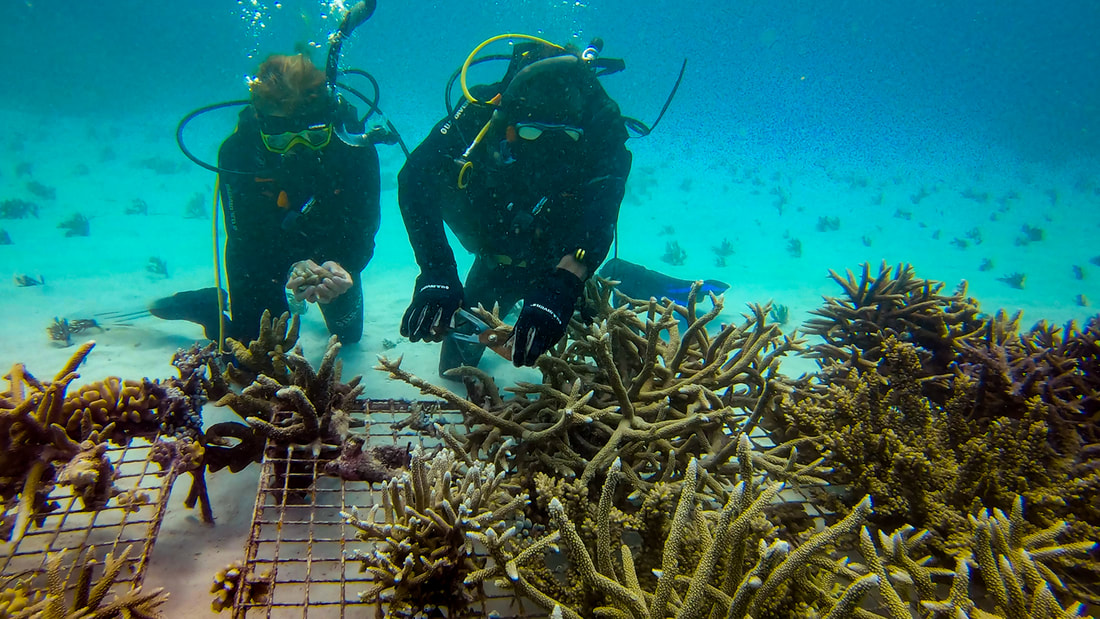Filmmaker Q&A with Alizé Carrère, Director/Producer of ADAPTATION: Coral Reefs of Vanuatu11/18/2022 Q: What inspired this story? In 2015, I was looking for stories about how people and communities around the world were adapting to profound environmental change. I was working on a film series that would hopefully capture what ‘adaptation’ looked and felt like not as a concept, but as a real lived experience for the millions of people who have no other choice. Around that time I came across the NGO Rare and their Solution Search contest. Solution Search was a call for anyone around the world to submit adaptation projects that were being implemented on the ground, with the hope of sharing and scaling some of the projects. I reached out to Rare and asked if I might be able to access the contest database for the series I was working on, to get some ideas. I came across an entry from a group in Vanuatu (on the islands of Nguna and Pele) working on composting efforts for a predatory starfish that was decimating coral reefs. The project sounded fascinating, so I contacted the group that submitted. The more I learned the more interesting the story got. I didn’t have funding at the time, so we stayed in touch over email for 3 years until I was able to make it to Vanuatu with my filmmaker friend and colleague Kyle Corea in 2018. Once we got there we were amazed by all of the additional adaptation efforts that were going on, including coral gardening and other impressive efforts to keep the reef alive. Q: Describe some of the challenges faced while making this film. As any documentary filmmaker knows, the funding was a real challenge…! I ended up self-funding the trip to Vanuatu itself because I didn’t want to lose out on capturing the story, but then we had to sit on the footage for 2 years before I was able to find the money to actually make the short film/episode. It was thanks to Pacific Islanders in Communications (PIC) that we got a grant to finish it. I had met Cheryl Hirasa of PIC through The Redford Center when I was a grantee there in 2018, and Cheryl really helped us get the short film done. It was through PIC that we were then put in touch with PBS, who ultimately provided the remaining funding to finish the whole series. Q: What's next? Now that the series lives on PBS, we are talking with them about a season 2 of Adaptation. The next batch of episodes will look at what adaptation means not as a technical or mechanical solution to an environmental problem, but rather adaptation as something deeply social and political – because it is! Successful adaptation to the challenges of climate change will ultimately depend on how well equipped and supported a community is in ways beyond financial means. For example, what policies are supporting or hindering resilience and adaptability? Are those policies just, equitable and intergenerational? How are people advocating for their future? Who is bearing the greatest adaptation burden and what can be done to distribute that burden more equally? These are the types of questions I am currently working on in my PhD research on climate change adaptation and that are critical to invoke in film projects covering climate change as well. Keep up with Alizé and her work on Instagram.
3 Comments
8/31/2023 04:17:36 am
Thank you for sharing such useful information. Continue to spread the word about your excellent work.
Reply
4/3/2024 03:56:47 pm
I recently read a fantastic article that transforms your bath routine into a spa-like retreat, offering tips on customization, budget-friendly luxury products, and the wellness benefits of indulgent baths, making it a must-read for anyone looking to elevate their self-care regimen. <a href="https://nutrifitessentials.com/elevating-your-weekend-with-the-ultimate-luxury-bath-experience/">Luxury Bath Experience</a>
Reply
1/29/2024 01:00:26 am
I read a lot of stuff and i found that the way of writing to clearifing that exactly want to say was very good so i am impressed and ilike to come again in future.
Reply
Leave a Reply. |
Archives
March 2024
Categories
All
|
Contact UsJackson Wild
240 S. Glenwood, Suite 102 PO Box 3940 Jackson, WY 83001 307-200-3286 info@jacksonwild.org |




 RSS Feed
RSS Feed